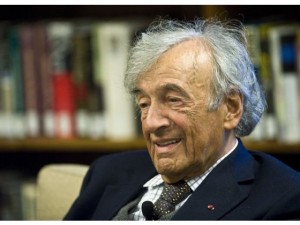Posted on September 27, 2012 at 9:39 am
Elie Wiesel and Survivor Guilt
This article is courtesy of Jett Rucker and Smith’s Report, where it appears in the current issue.
 Since Elie Wiesel is “the world’s most famous Holocaust survivor,” I asked Mr. Rucker if I could post his article here. It does an effective job of putting the term “holocaust survivor” into a more realistic context – one that includes all “survivors.” I have added the sub-headings and pictures, and done very slight editing (removing some phrases in parentheses) for ease of reading.
Since Elie Wiesel is “the world’s most famous Holocaust survivor,” I asked Mr. Rucker if I could post his article here. It does an effective job of putting the term “holocaust survivor” into a more realistic context – one that includes all “survivors.” I have added the sub-headings and pictures, and done very slight editing (removing some phrases in parentheses) for ease of reading.
Of course, my position remains that it is doubtful Elie Wiesel was in the camps at all. Thus, his “survivor guilt” might be even greater than if he were, and survived. Can that explain his lifelong campaign on behalf of keeping “Memory” alive of what occurred, both fictitious and real? Some might think so, but perhaps a better explanation is plain old opportunism. The many favors and privileges Wiesel has obtained throughout his lifetime are based on his “survivorship;” keep that in mind as you read the following.~cy [Image: Ye olde survivor Elie Wiesel has lived the good life, as his contented face reveals.]
Survivor Guilt
by Jett Rucker
“Survivor guilt” has come into popular usage as an irrational complex on the part of people who are among a very small number of people who, by sheer happenstance, have emerged alive from a disaster that took the lives of many others who seem to have deserved no more (or less) to have survived than they (the survivors) did. Occasionally, for example, a plane crash occurs from which one, or perhaps two, victims emerge relatively unscathed, while all their fellows perished in the catastrophe. The complex plagues them for years after the event, in some cases.
Now and then, though, some sort of more-genuine guilt may seem to attach to the fact of survivorship, as in the case of the (surviving) members of a Uruguayan rugby team who committed (and admitted to) cannibalism in the process of surviving two months on a remote peak in the Andes where their plane had crashed in 1972. The surviving cannibals were absolved of their “sin” by the Pope, whom both the perpetrators and, presumably, the victims acknowledged as their spiritual shepherd.
A stronger presumption of actual guilt on the part of survivors might attach, say, to adult male survivors of the Titanic sinking in 1912, as they might be suspected of having violated or otherwise evaded the famous stricture supposedly invoked at the time, “Women and children first.” Some male passengers apparently did that, while others are thought to have boarded life boats that were about to depart the sinking vessel with empty seats in them.
The dead have not been heard from …
And then, there are those long-term situations imposed by a hostile group of others, in which a potential for treachery, betrayal, collaboration, or even fouler play might enter the picture. In the annals of human conflict, undoubtedly war provides the greatest number of these situations, especially if they are rated by numbers of either: (a) dead victims, who cannot testify as to what occurred; or (b) survivors, who perforce provide the only narratives available as to what occurred. Be it noted: neither group, not individually nor collectively, is in a position to even understand all of what did happen, quite aside from what might have happened had anyone acted differently from the way they did.
War veterans are no doubt the most-numerous of the groups that fit the description above, including both those who survived and those who, not surviving, never gained the exalted status of veterans. I often wonder how the glories of past victories (and defeats) might be perhaps somewhat dimmed if the voices of the dead might be heard on the occasions when the glories are celebrated among the survivors and their putative beneficiaries.
 War Industry Workers: “survivors” or veterans?
War Industry Workers: “survivors” or veterans?
A very special, if demographically dwindling, group remains in our midst who command, and lately often claim, reverence that is not accorded even to veterans of this (or other) nation’s wars. These are those who claim to have been forced by the National Socialist regime that governed Germany from 1933 to 1945 to leave their homes and properties in Germany for resettlement or labor camps to the east of Germany because they were Jews, as well as those Jews resident in countries east of Germany who were dragooned into service in Germany’s war-industry plants such as those in Birkenau, Dora-Mittelbau, and over a thousand other locations: “Holocaust survivors,” as they style themselves.
Such persons (the genuine ones among the many claiming such status with no basis whatsoever in truth) are survivors, if at all, only in the sense that anyone residing in Germany or Austria by the time World War II reached its catastrophic end was a survivor. What they survived was not forced labor (to which many were indeed subjected), but the blanket devastation wreaked by Allied bombers upon the domiciles of the entire populace of their “targets.” Insofar as their survival involved their conscription into forced labor in war-industry factories, such fortunates may as well be designated “veterans” as their less-fortunate predecessors were conscripted to go to the front, there to confront the irresistible onslaught of Soviet manpower and American productivity.
Be all this as it may, all an elderly Jew in America with any sort of claim to European origins need do to command instant respect and credulity among those around him or her, is to invoke the sacred appellation, “Holocaust Survivor.” Once this is done, silence reigns all around, and rapt attention is reflexively granted by all those in attendance, they all having long since been conditioned to render such obeisances upon hearing the Pavlovian Bell.
Jewess Anna Breslaw questions the innocence of “Holocaust survivors”
 An intrepid, if possibly naïve, American Jewess of unwonted analytic disposition, Anna Breslaw, writing for the Tablet, ventured the irrefutable speculation that some of the few genuine “Holocaust survivors” among those many claiming the vaunted status might, indeed, have survived the parlous times they undoubtedly went through, by way of guile, or even treachery, in a few cases.* She did not trouble her argument with particulars as to how her co-religionists might have collaborated, contrived, betrayed, or otherwise arranged for themselves the favored treatment that enabled them to “survive,” but the force of her argument was sufficient to rouse into action none other than that Centurion of the Sanctity of the Holocaust Mythology, Jeffrey Goldberg of the Atlantic Magazine. He styled Breslaw’s impeccable logic as “ghastly.”
An intrepid, if possibly naïve, American Jewess of unwonted analytic disposition, Anna Breslaw, writing for the Tablet, ventured the irrefutable speculation that some of the few genuine “Holocaust survivors” among those many claiming the vaunted status might, indeed, have survived the parlous times they undoubtedly went through, by way of guile, or even treachery, in a few cases.* She did not trouble her argument with particulars as to how her co-religionists might have collaborated, contrived, betrayed, or otherwise arranged for themselves the favored treatment that enabled them to “survive,” but the force of her argument was sufficient to rouse into action none other than that Centurion of the Sanctity of the Holocaust Mythology, Jeffrey Goldberg of the Atlantic Magazine. He styled Breslaw’s impeccable logic as “ghastly.”
Goldberg advanced the view of what he hopes might still be the dominant view of Jewish and Jewish-conditioned readers of his widely circulated platform. Maybe it is, and maybe the Tablet has got the ear (mind, heart) of thoughtful readers of both (or all) publications. Goldberg’s time-worn imprecations bear inspection, as do Breslaw’s rather more-nuanced comments, made, be it noted, in a context rather remote from the ones implied in Goldberg’s tirade.
Can real “Holocaust survivors” really be innocent?
Breslaw’s well-considered cautions arrive on the American scene at a critical time when real “Holocaust Survivors” have faded from the scene that they never had the temerity to dominate in the first place, but self-qualified “survivors” have taken their place to affect shock and affront at such “disparagements” as Breslaw offers. Real “Holocaust survivors,” keenly aware from genuine experience what moral ambiguity attends the status to which they could lay claim, have always remained reticent in proclaiming the particulars of their experiences, and acts. Those many who lack this experience, but claim it by implication, let on as though they were blameless both in terms of their incarceration in the first place, but further—and this is the stretch—as to their deportment while actually incarcerated.
The act can be pulled off only by those quite innocent of the genuine experience. Those who affect utter innocence in the fates they claim may be dismissed as being innocent not only of guilt, but also of the experiences they claim to have.
As for Goldberg, and his magazine, we may consign them to a category reserved for those liars who propose to benefit from the success that may be enjoyed by still other liars.
*Of particular interest to us is this passage by Breslaw:
… in grade school I received the de rigueur exposure to the horror—visiting geriatric men and women with numbers tattooed on their arms, completing assigned reading like The Diary of Anne Frank and Night. But the more information I received, the less sympathy the survivors elicited from me. Each time we clapped for the old Hungarian lady who spoke about Dachau, each time Elie Wiesel threw another anonymous anecdote of betrayal onto a page, I eyed it askance, thinking What did you do that you’re not talking about? I had the gut instinct that these were villains masquerading as victims who, solely by virtue of surviving (very likely by any means necessary), felt that they had earned the right to be heroes, their basic, animal self-interest dressed up with glorified phrases like “triumph of the human spirit.”
Categories Featured | Tags: "Holocaust survivors", Anna Breslaw, Elie Wiesel, Jeffrey Goldberg, Tablet Magazine
Leave a Reply
By submitting a comment here you grant Elie Wiesel Cons the World a perpetual license to reproduce your words and name/web site in attribution. Inappropriate or irrelevant comments will be removed at an admin's discretion.



2 Comments to Elie Wiesel and Survivor Guilt
by Donna Bowes
On February 1, 2015 at 9:56 pm
He who does not remember the past is condemned to relive it( not my quote. Rather one one from a greater mind than mine).
by Carolyn
On February 14, 2015 at 6:39 pm
It’s from Santayana.